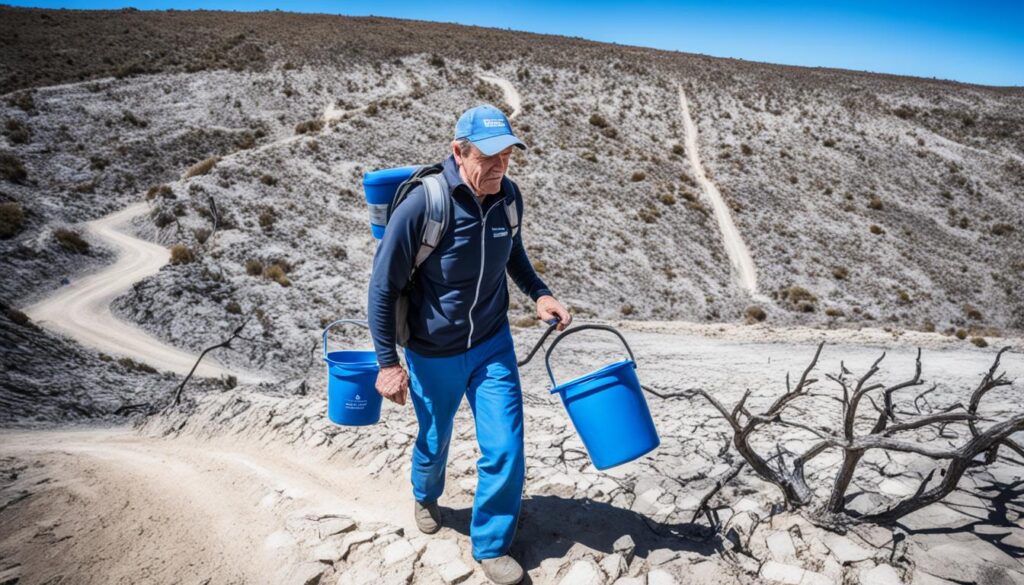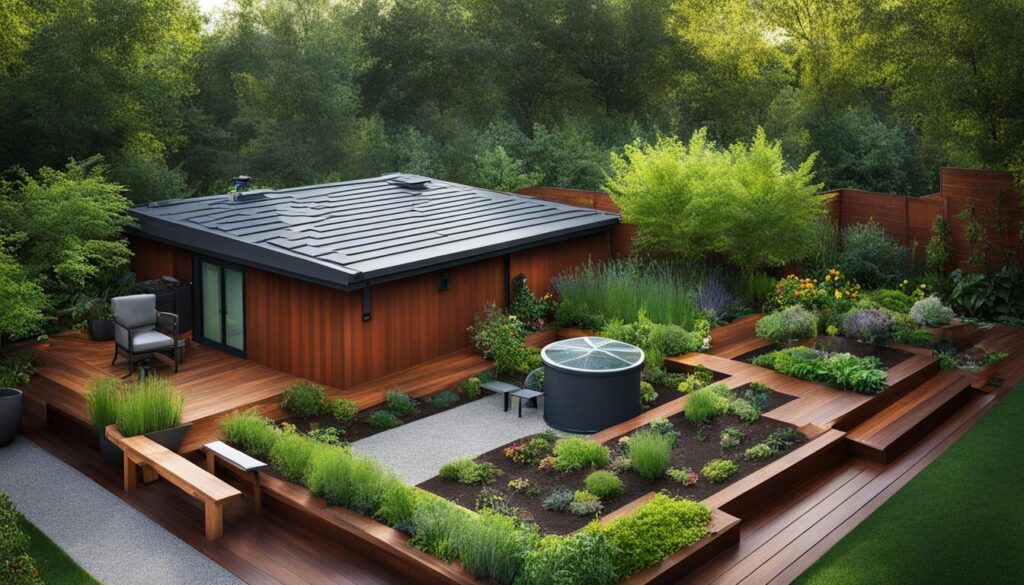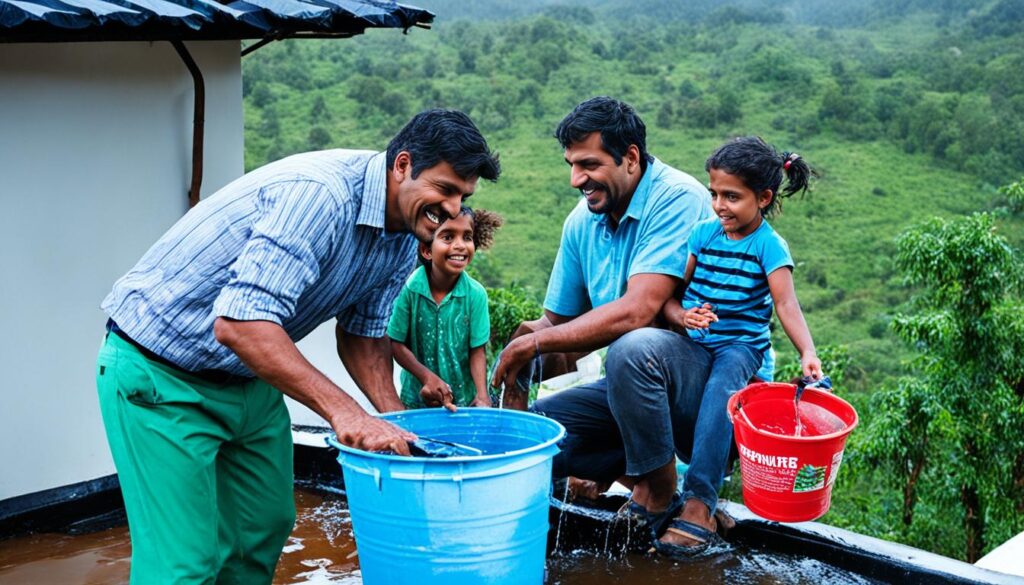From changing everyday habits to choosing water-efficient appliances, there are plenty of ways to make every drop count and embrace a sustainable lifestyle in Victoria. By implementing simple water-saving habits like shortening showers, turning off taps, and fixing leaks, individuals can reduce their water usage and contribute to the conservation of this precious resource. Additionally, reusing greywater, installing water-efficient showerheads, dual-flush toilets, and buying water-efficient washing machines can significantly reduce water consumption in the home. Outdoor water-saving tips include watering gardens wisely, choosing native plants, and installing rainwater tanks or raingardens. The Victorian government also provides support for vulnerable customers through rebates and concessions. By following these water conservation tips, individuals can embrace eco-friendly practices and contribute to environmental awareness and sustainable living in Victoria.
Key Takeaways:
- Implement simple habits like shortening showers and turning off taps to reduce water usage.
- Reuse greywater and install water-efficient appliances to further conserve water in the home.
- Water gardens wisely, choose native plants, and consider installing rainwater tanks for outdoor water conservation.
- Victorian government offers support for vulnerable customers through rebates and concessions.
- Embracing these water conservation tips promotes environmental awareness and sustainable living in Victoria.
Simple Water-Saving Habits
Most people only need to save a small amount of water to reach the target of 150 litres per day. Making simple changes to everyday habits can easily achieve this goal. By incorporating these habits into daily routines, individuals can significantly reduce their water usage.
Here are some easy water conservation tips that can be adopted as part of your everyday habits:
- Take shorter showers: Aim to reduce shower time by a few minutes. This can save a significant amount of water.
- Brush teeth with the tap off: Turn off the tap while brushing your teeth to avoid unnecessary water wastage.
- Use the hose sparingly: Only use the hose when necessary and avoid leaving it running when not in use.
- Fix leaks: Regularly check for and fix any leaks in faucets, pipes, or toilets. Even small drips can add up to significant water loss over time.
- Scrape plates instead of rinsing them: When cleaning dishes, try to remove food scraps by scraping them into the trash or compost bin instead of rinsing them.
- Use a plug or container in the sink: Use a plug or a container filled with water in the sink when washing dishes or preparing vegetables. This will prevent excessive water from flowing down the drain.
Implementing these simple water-saving habits can make a big difference in reducing water consumption and promoting sustainable living.
“We all have the power to make a positive impact on the environment by changing our everyday habits.”
Indoor Water-Saving Tips
Conserving water indoors is crucial for sustainable living. By implementing a few simple changes, you can significantly reduce your water consumption. Here are some effective water conservation tips for your home:
1. Reusing Greywater
Reuse greywater from your laundry or bathroom to keep your garden green. Collect water from the washing machine’s final rinse cycle or while waiting for the shower or bath to warm up. Treated greywater can also be used for flushing toilets and washing clothes.
2. Water-Efficient Showerhead
Installing a water-efficient showerhead can make a big difference in reducing water usage. These specialized showerheads can save over 10,000 litres of water per year without compromising the shower experience.
3. Dual-Flush Toilet
A dual-flush toilet is another excellent investment for water conservation. With two flush options – one for liquid waste and another for solid waste – a dual-flush toilet can save approximately 35,000 litres of water annually for a family of four.
4. Water-Efficient Washing Machine
Consider investing in a water-efficient washing machine, especially a front-loading one. These machines use less water per load compared to traditional top-loading machines, resulting in significant water savings over time.
By incorporating these indoor water-saving tips into your daily routine, you can contribute to water conservation efforts and reduce your environmental footprint.
Outdoor Water-Saving Tips
When it comes to outdoor water usage, it’s important to be smart about watering gardens. By following these water conservation tips, you can not only help conserve water but also create a thriving and sustainable garden.
Watering Wisely
One of the key ways to save water in your garden is to water it wisely. Watering during the cooler morning hours helps to reduce evaporation, allowing plants to absorb water more efficiently. Avoid watering during the hottest parts of the day, as this can lead to water wastage.
Increasing Water Absorption
Using mulch or compost in your garden is another effective strategy for water conservation. These organic materials help to retain moisture in the soil, reducing the need for frequent watering. Mulching also helps to suppress weed growth, making your garden more manageable.
Choosing Native Plants
When selecting plants for your garden, opt for native species that are adapted to the dry conditions of Australia. These plants have developed natural mechanisms to thrive in low-water environments, reducing the need for excessive watering. Native gardens not only save water but also provide essential habitats for local wildlife.
Installing a Rainwater Tank
An excellent way to reduce your reliance on mains water for gardening is to install a rainwater tank. These tanks collect rainwater from your roof, which can then be used to water your plants. Not only does this help conserve water, but it also reduces your water bills.
Building a Raingarden
If you’re looking for a more sustainable garden solution, consider building a raingarden. A raingarden is a shallow depression in your yard that collects rainwater runoff. By incorporating native plants and permeable soil, raingardens allow water to infiltrate the ground, reducing stormwater runoff and promoting groundwater recharge.
Implementing these outdoor water-saving tips can make a significant difference in water conservation efforts. By watering wisely, using mulch or compost, choosing native plants, and utilizing rainwater tanks or raingardens, you can create a beautiful and eco-friendly garden while reducing your water footprint.
Support for Vulnerable Customers
The Victorian Government remains committed to promoting water conservation and ensuring equal access to water-saving measures for vulnerable customers. Through various rebates and concessions, eligible cardholders and individuals facing financial hardship can benefit from reduced water consumption and lower water bills.
These initiatives play a vital role in fostering sustainable living practices and raising environmental awareness among all members of the community. By providing financial assistance, the government encourages vulnerable customers to actively participate in water conservation efforts.
Rebates and concessions are designed to help alleviate the financial burden of water bills while also promoting the adoption of eco-friendly practices. Through these programs, vulnerable customers can access rebates for water-efficient appliances, such as washing machines and dishwashers, as well as assistance with plumbing repairs to minimize water wastage.
The government recognizes the importance of supporting vulnerable customers in their efforts to conserve water and navigate financial challenges. By ensuring affordable access to water-saving measures, we can create a more sustainable future for all members of our community.
| Rebates and Concessions | Description |
|---|---|
| Water-efficient appliances | Rebates available for the purchase of water-efficient washing machines and dishwashers, promoting water conservation in households. |
| Plumbing repairs | Financial assistance for plumbing repairs to fix leaks and reduce water wastage in vulnerable customers’ homes. |
| Eligibility | Vulnerable customers and eligible cardholders facing financial hardship can apply for rebates and concessions. |
We believe that by providing support to vulnerable customers, we can empower individuals and communities to embrace water conservation practices and contribute to a more sustainable Victoria.

Water Saving Tips You Can Start Today
As part of our commitment to sustainability and water conservation, we have compiled a list of simple yet effective water-saving tips that you can implement in your daily life. By making these small changes, you can contribute to sustainable living practices and reduce your water usage.
Capture Shower Water
One of the easiest ways to save water is by capturing the water that goes down the drain while you’re waiting for your shower to warm up. Simply place a bucket under the showerhead to collect this water, which can then be used to water plants or flush toilets.
Minimize Toilet Flushes
Another way to conserve water is by minimizing toilet flushes when unnecessary. For example, if you’ve only used the toilet for urine, consider using the “If it’s yellow, let it mellow” approach. By flushing less frequently, you can save a significant amount of water over time.
Turn Off Taps
Make it a habit to turn off the taps while brushing your teeth or washing your hands. This simple act can save gallons of water each day. Remember, every drop counts!
Take Shorter Showers
Reducing your shower time is an effective way to conserve water. Aim to take shorter showers by timing yourself and gradually decreasing the duration. Not only will this help save water, but it will also save energy used to heat the water.
Wait to Run the Dishwasher or Washing Machine Until Full
When it comes to running appliances like dishwashers and washing machines, wait until they are full before starting a cycle. Running these appliances with a full load maximizes water efficiency and reduces water wastage.
By incorporating these water-saving tips into your daily routine, you can make a significant impact in reducing water usage and promoting sustainability. Remember, every action counts!
| Water-Saving Tip | Benefits |
|---|---|
| Capturing shower water in a bucket | – Provides water for plants or flushing toilets – Reduces overall water consumption |
| Minimizing toilet flushes | – Saves significant amounts of water – Promotes water conservation |
| Turning off taps while brushing teeth or washing hands | – Saves gallons of water daily – Reduces water wastage |
| Taking shorter showers | – Helps conserve water and energy – Supports sustainable living practices |
| Waiting to run the dishwasher or washing machine until full | – Maximizes water efficiency – Reduces water usage and wastage |
Water Saving Practices to Invest In
Investing in water-saving practices is a proactive step towards enhancing water conservation efforts. By adopting these practices, we can reduce our water consumption and contribute to the sustainable management of this valuable resource. Here are some practical water-saving practices to consider:
Rainwater Catchment System
One effective way to conserve water is by installing a rainwater catchment system. These systems collect and store rainwater for various purposes, such as watering gardens, flushing toilets, or washing cars. By utilizing rainwater instead of relying solely on municipal water sources, we can reduce our reliance on treated water and help conserve this precious resource.
Leak Repairs
Repairing leaks promptly is crucial in preventing water wastage. Even small leaks can add up to significant amounts of water over time. By regularly inspecting and repairing leaks in faucets, toilets, pipes, and irrigation systems, we can minimize water loss and maximize water efficiency in our homes.
Water-Efficient Appliances
Investing in water-efficient appliances is another impactful way to save water. Look for appliances such as low-flow showerheads, efficient dishwashers, and washing machines with high water efficiency ratings. These appliances not only reduce water consumption but also contribute to energy savings, making them a sustainable choice for your home.
Lawn Replacement
Consider alternatives to traditional lawns that require excessive amounts of water to maintain. Water-wise ground cover or succulent gardens are excellent options that can significantly reduce outdoor water usage. These alternatives not only conserve water but also add beauty and diversity to your landscape.

By implementing these water-saving practices, we can make a significant impact on water conservation in our communities. Remember, every drop counts, and our collective efforts can create a more sustainable future for all.
Sustainable Water Strategies in Victoria
Sustainable water strategies play a crucial role in securing a region’s long-term water supply and managing threats to water availability and quality. In Victoria, we have implemented three regional sustainable water strategies to address these challenges:
1. Central and Gippsland Region Sustainable Water Strategy
2. Northern Region Sustainable Water Strategy
3. Western Region Sustainable Water Strategy
These strategies include comprehensive policies and actions aimed at better managing and responding to water-related challenges in each region. By implementing these strategies, we aim to ensure the sustainable use of water resources and protect water quality for future generations.
Our sustainable water strategies are developed through a collaborative effort involving various stakeholders, including the water sector, Traditional Owners, and the community. This collective approach enables us to leverage diverse expertise and perspectives, ensuring effective and inclusive water management.
To monitor the progress and effectiveness of our strategies, we conduct regular monitoring and reporting on the implementation of actions. These reports provide valuable insights into the achievements and areas for improvement, allowing us to make informed decisions and refine our approaches.
Through these sustainable water strategies, we strive to enhance water availability and quality, mitigating the impacts of climate change and population growth. By prioritizing long-term sustainability and fostering resilience in our water sector, we can ensure a reliable water supply for Victoria’s communities and ecosystems.
Key Highlights:
| Sustainable Water Strategies | Benefits |
|---|---|
| Central and Gippsland Region Sustainable Water Strategy | – Improved water resource management – Enhanced water quality – Increased resilience to drought – Protection of ecosystems |
| Northern Region Sustainable Water Strategy | – Sustainable use of water resources – Reduced water stress – Efficient irrigation practices – Preservation of natural habitats |
| Western Region Sustainable Water Strategy | – Integrated water planning and management – Water recycling and reuse initiatives – Sustainable urban development – Protection of groundwater resources |
By implementing these sustainable water strategies, we can ensure the availability of clean, reliable, and sustainable water resources for current and future generations. Together, let’s prioritize the responsible management of our precious water resources and create a more sustainable future for Victoria.
Conclusion
Embracing water conservation tips and adopting sustainable living practices are essential for preserving our water resources and protecting the environment in Victoria. By making small changes to everyday habits, such as shortening our showers and turning off taps, we can significantly reduce water usage and contribute to water conservation efforts. Installing water-efficient appliances like showerheads, toilets, and washing machines further minimize our water consumption.
Additionally, reusing greywater from our laundry and bathroom can effectively conserve water and support a more sustainable lifestyle. By implementing these eco-friendly practices, we not only reduce our ecological footprint but also contribute to environmental awareness and preservation of our natural resources.
Together, we can create a more sustainable future for Victoria by working towards water conservation and embracing eco-friendly practices. Let us continue to prioritize environmental awareness and make conscious decisions to protect our precious water resources for current and future generations. By doing so, we contribute to a sustainable living culture in Victoria and beyond.
FAQ
What are some simple water-saving habits?
Some simple water-saving habits include taking shorter showers, turning off taps when not in use, fixing leaks, and using a plug or container in the sink when washing dishes.
What are some indoor water-saving tips?
Indoor water-saving tips include reusing greywater from the laundry or bathroom, installing water-efficient showerheads and dual-flush toilets, and buying water-efficient washing machines.
How can I save water in my garden?
To save water in your garden, you can water plants in the morning, choose native plants, and install a rainwater tank or raingarden.
What support is available for vulnerable customers?
The Victorian Government provides support for vulnerable customers through rebates and concessions to help reduce water consumption and lower water bills.
What are some water-saving habits I can start today?
Some water-saving habits you can start today include capturing shower water in a bucket, minimizing toilet flushes, turning off taps when not in use, and waiting to run the dishwasher or washing machine until they are full.
What water-saving practices should I invest in?
You can invest in water-saving practices such as installing a rainwater catchment system, repairing leaks promptly, and using water-efficient appliances.
What are sustainable water strategies in Victoria?
Sustainable water strategies in Victoria include regional strategies that aim to better manage and respond to water-related challenges in collaboration with the water sector, Traditional Owners, and the community.
How can water conservation contribute to sustainable living?
Water conservation contributes to sustainable living by reducing water usage, promoting environmental awareness, and embracing eco-friendly practices.
